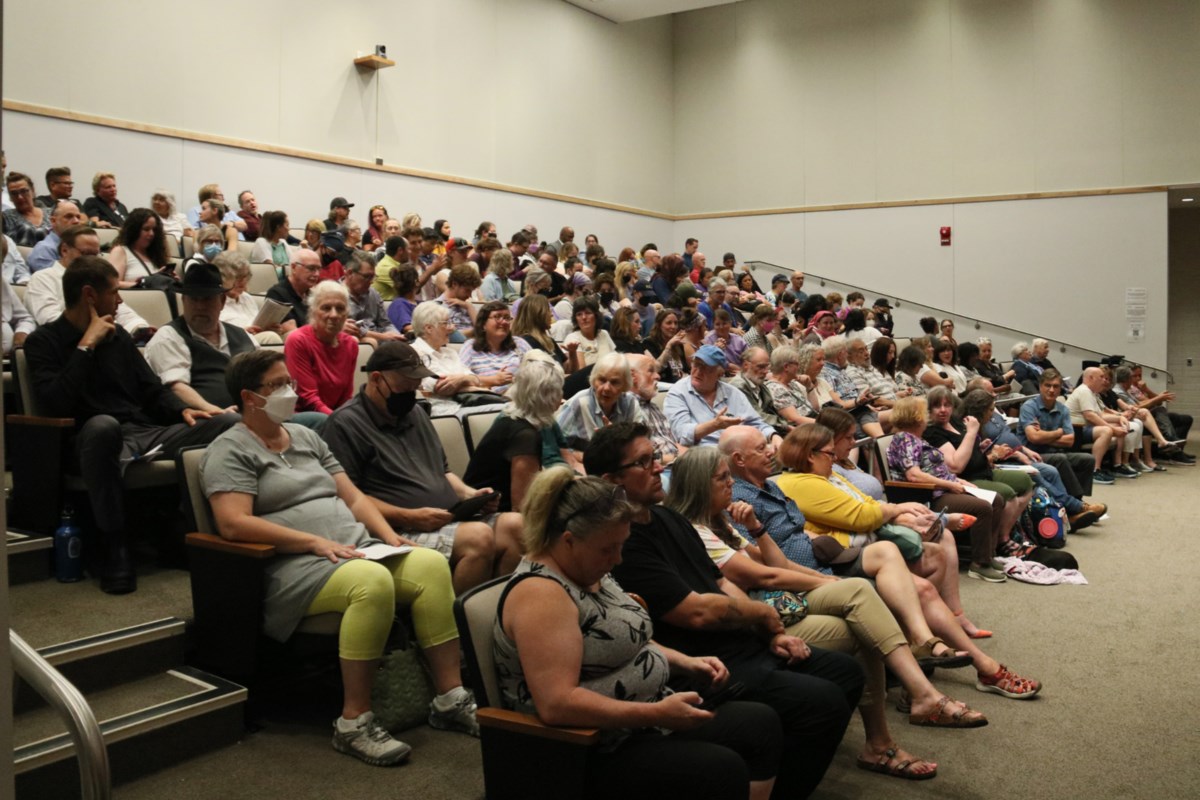Council approves controversial public space use draft bylaw
Bylaw, which will dictate where encampments can and cannot be, will return for final approval in September
Guelph city council is moving forward with a controversial bylaw that would restrict homeless encampments on city property.
After a seven-and-a-half-hour meeting with an hour-long in-camera legal discussion, five hours’ of hearing from 45 delegations, and a protest beforehand, council voted 10-3 in favour of the draft bylaw.
The bylaw would ban encampments in spaces with competing public use during daytime hours, establish separation distances between encampments and school properties, childcare centres, railways, waterways and cemeteries. This also includes spaces used by pets, children, sidewalks, pathways and recreational trails for instance.
Building supplies, water or refuse could not be gathered and stored on city property unless kept inside a permissible temporary structure.
In areas where encampments are permitted, up to five structures or shelters would be allowed, though they must be distanced from other encampment groupings and school or childcare centres.
Staff noted there would be no set fines associated with the bylaw, though if people don’t comply, a trespass could follow, after which it could progress further.
This is the second time the bylaw has been presented to council. The first time was in February, with protesters storming city hall and tensions high throughout. It was deferred until after the appeal court ruling was released and analyzed regarding a challenge of a similar bylaw in Kingston that was ruled unconstitutional.
But the Kingston appeal was withdrawn without being heard in the spring, and the proposed bylaw was removed from Guelph’s to-do list, stopping all engagement.
In mid-August, Mayor Cam Guthrie requested the unchanged draft bylaw be presented once again to council at the special council meeting held Wednesday night.
Councillors Erin Caton, Phil Allt and Linda Busuttil voted against.
An amendment brought forward by Counc. Carly Klassen was also passed, with Caton, Allt and Busuttil voting against, for the bylaw to specifically cover the entirety of St. George’s Square and Market Square as sensitive public areas.
While tensions perhaps weren’t as high this time, with no security intervention needed, the sentiments shared among both sides remained the same.
Of the 45 delegates who spoke, those against the bylaw voiced concerns the bylaw would only exacerbate the homelessness, mental health and drug poisoning crises that Guelph is currently facing by moving those living rough away from essential services downtown.
Council was repeatedly told the bylaw is discriminatory, had next to no public consultation and will bring the city expensive legal action.
Several times it was said by delegates, as well as Caton, the bylaw is criminalizing homelessness, though several councillors tried to assure the public that’s not the case.
“We’re not saying no, we’re saying where. And I think that’s important context,” Coun. Dan Gibson said.
Those in favour largely cited safety concerns around issues like open drug use and physical altercations.
Michael Kennedy said he and his family avoid downtown and trails, and that his young daughter was “attacked by a homeless person” with things thrown at her; he mentioned encampments regularly engulfed in flames, and discarded used drug paraphernalia.
“Our downtown is now embarrassing,” he said.
Delegate Julio Rodriguez said the encampments downtown are repulsive monstrosities, and that doing hard drugs in a public space should never be the norm.
However, many delegates, including some councillors, noted the bylaw is merely a type of zoning bylaw and will not solve those issues.
Ella Elliot shared a story of her mother finding the decomposed remains of 24-year-old Cody Thompson while kayaking.
“The encampment that Cody’s body was found near was in what is going to be a fully permissible space, which means that he was not near any community resources at the time of his passing. As a direct result of that, we lost a young life, and that is going to continue if we let this pass.”
Every single dollar spent discussing the bylaw “could be spent actually solving the root causes… but we are choosing to prioritize the comfort of the people that shop downtown over the lives of people on the street, and that is despicable to me.”
Stephanie Clendenning, executive director of the Legal Clinic of Guelph and Wellington, also pointed to other cities that have faced and are facing litigation for similar bylaws, and said that if council think theirs is permissible, “you would be wrong.”
Hamilton, for instance, is just weeks away from a second round of litigation for charter violations from a similar bylaw. The decision, she said, will be binding on other municipalities including Guelph.
“So what are we doing here? Guelph is not above the law. You cannot legislate your way around it,” she said.
“(These delegations) completely validated the reasons why I wanted to bring this forward and call a special meeting,” said Mayor Cam Guthrie. “The bylaw, the way its been crafted with our professional staff has it laid out in a way that actually gives some regulation.”
Passed in the end, the remaining delegates shouted “shame” and “see you in court” as council left the chambers.
If the bylaw is approved for final adoption on Sept. 10, it will come into effect Oct. 1.


